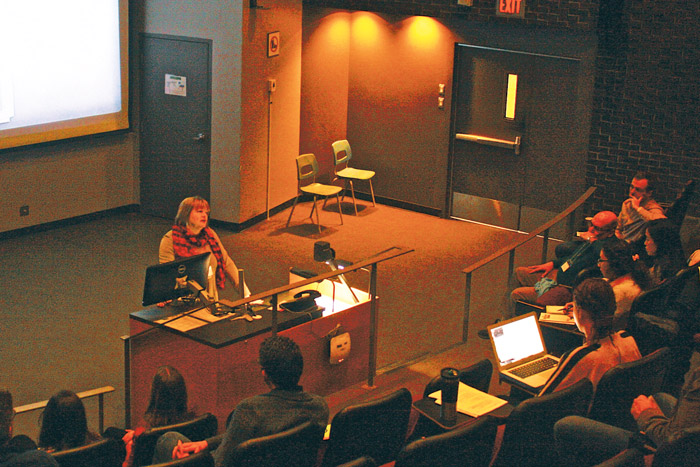Students from the Faculty of Science often find themselves struggling to pick a path after graduation. Sometimes, when it feels like an M.D. or Ph.D. is the only option, a science major can feel trapped. In a series of presentations, McGill’s Biochemistry Undergraduate Society (BUGS) showcased the possibilities and the flexibility that a biochemistry degree can provide at its 2015 Alumni Career Symposium on Saturday, Feb. 21. Speakers included high school teachers, industry representatives, MD-PhD students, and urban gardeners.
“We want to show students that there are many other opportunities out there,” explained Alexandr Magder, U2 Science and representative from BUGS.
While the paths taken by these individuals were all unique, they all had one thing in common—they chose their path because they were interested in it.
“People are like ‘be a doctor or be a scientist,’ and I [said] no, I wanted to do both,” explained Adam Fontebasso, a graduate of the Honours Biochemistry program, who is in the clinical phase of medical school within McGill’s MD-PhD program.
An MD-PhD program gave Fontebasso an opportunity to fulfill his desire to work both in the lab and with patients.
However, not everyone’s a ‘lab rat,’ explained Dr. Donna Rindress, who co-founded BioMedCom Consultants—where healthcare technology is adopted using evidence and rationale. Rindress, after completing a Ph.D. in biochemistry from McGill, delved into the industry world.
“To work with industry, the most important thing to realize is that it’s not academic research, it’s pragmatic research—[you] have to give someone something that is useful,” she explained.
Paul Farkas, now a Human Resources (HR) representative for industrial engineering giants in Calgary, echoed this need for pragmatism.
“Virtually every organization in the world will say, ‘In this company, we pay for performance,’” Farkas said. “I was interviewing for an [HR position in a] large nuclear energy company, and I asked the president, ‘How do you determine your compensation?’ He said it’s easy, ‘I pay for performance.’”
To prove this, Farkas, on his first day on the job, then using a series of performance analysis programs, found zero correlation between pay increase and performance—the company’s president wasn’t paying his employees for the quality of their work. Their salaraies, Farkas found, were solely correlated to their starting salary. According to Farkas, his ability to approach a problem like a scientist and to look at a problem empirically is due in part to his training at McGill.
Powerful problem-solving skills are what helped Lauren Rathmell bring fresh fruits and vegetables to urban areas. Rathmell is the Greenhouse Director and a founding member of Lufa Farms, a for-profit urban farm located in Montreal.
“There’s a huge greenhouse industry in Canada, but we’re doing things differently—strategizing and coming up with our own methods to do things,” Rathmell explained.
While creating one’s own start-up is not necessarily the easiest task in the world, it is extremely rewarding, explained Rathmell—with this company, she is living and breathing her work.
While the idea of following a so-called ‘unconventional path’ can seem overwhelming, breaking the standard is something McGill bioinformatics professor Michael Hallet encourages everyone to do.
“Learn how to program, take some Bioinformatics, move to San Francisco, and walk into Google with some good ideas,” Hallet said.
While that path may not be the one for everyone, the message remains the same.
“There are opportunities to work in other areas such as management consulting, teaching, or [even] becoming a patent agent,” explained event organizer Larischa DeWet, VP Internal for BUGS.
For a person who is bored by the idea of research or medical work, many options remain open—it’s just a matter of looking for them.









